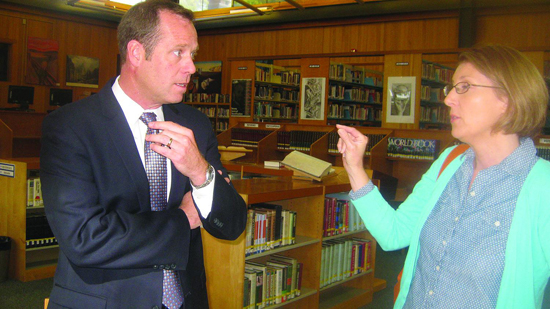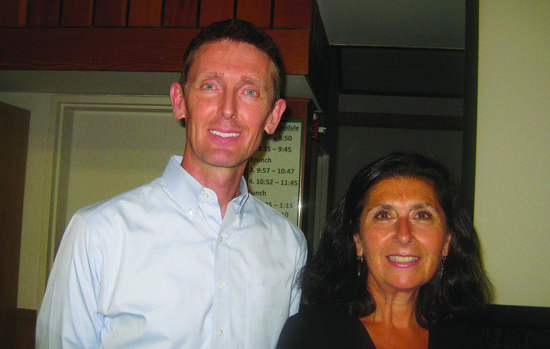 | | | Campolindo High School principal John Walker talks to parent Kathi Torres after a presentation about transitioning to high school. Photos Chris Lavin
| | | | | | Both Miramonte and Campolindo high schools reached out to parents of freshmen late last month to affirm what most already knew: No one is in Kansas anymore.
 "This is a tremendously tumultuous time," said John Barakos, Campolindo's crisis counselor, speaking to a group of parents who came to the school library Sept. 24. "Your job is to help your students with those changes. And it's change for you, too."
"This is a tremendously tumultuous time," said John Barakos, Campolindo's crisis counselor, speaking to a group of parents who came to the school library Sept. 24. "Your job is to help your students with those changes. And it's change for you, too."
 That night a similar scene was played out at Miramonte High School, where psychologist Brian Clark and associate principal Jan Carlson walked parents through how this year will differ from parenting a middle school student. They cautioned parents to be prepared, because schedules and demands on students' time will become even more intense next year.
That night a similar scene was played out at Miramonte High School, where psychologist Brian Clark and associate principal Jan Carlson walked parents through how this year will differ from parenting a middle school student. They cautioned parents to be prepared, because schedules and demands on students' time will become even more intense next year.
 "There are simple things you can do to make your child successful," Carlson said. "Make sure they are in school and on time, check School Loop and reports, and discuss everything openly."
"There are simple things you can do to make your child successful," Carlson said. "Make sure they are in school and on time, check School Loop and reports, and discuss everything openly."
 For the hundreds of freshmen who started at the two high schools this fall, the transition marks an important time for teens starting to break away and distance themselves from the bonds of family. To make things more challenging, parents and guardians trying to help with the transition may frequently find themselves stone-walled when they seek answers to basic information about how their students are feeling about school so far, or even about what homework they have that night.
For the hundreds of freshmen who started at the two high schools this fall, the transition marks an important time for teens starting to break away and distance themselves from the bonds of family. To make things more challenging, parents and guardians trying to help with the transition may frequently find themselves stone-walled when they seek answers to basic information about how their students are feeling about school so far, or even about what homework they have that night.
 "Try to have a dialogue," Clark said. He asked his audience how many of them had 3.9 or 4.0 grade point averages when they were in high school. Only a few of about 100 hands went up.
"Try to have a dialogue," Clark said. He asked his audience how many of them had 3.9 or 4.0 grade point averages when they were in high school. Only a few of about 100 hands went up.
 "We're not in that world anymore," Clark said. "Here, every student is going for that. We find that three quarters of all kids are stressed by school work and extra-curricular activities. They don't get enough sleep. This is a very high-achieving community."
"We're not in that world anymore," Clark said. "Here, every student is going for that. We find that three quarters of all kids are stressed by school work and extra-curricular activities. They don't get enough sleep. This is a very high-achieving community."
 While some children won't open up to parents, it's very important to get them talking, Clark said.
While some children won't open up to parents, it's very important to get them talking, Clark said.
 "The goal here is to build resilience, a critical life skill," he said. "Make sure they have someone to talk to. Non-parental relationships are important, too."
"The goal here is to build resilience, a critical life skill," he said. "Make sure they have someone to talk to. Non-parental relationships are important, too."
 Both school staffs emphasized the importance of signing up for parents' club bulletins, and for School Loop, an Internet software tool on which teachers regularly update homework assignments and grades. (Parents may sign up through their school's website.) But school officials also cautioned that using School Loop too frequently can cause "a lot of anxiety and stress. It's a long semester, and grades will go up and down," said John Walker, Campolindo's principal.
Both school staffs emphasized the importance of signing up for parents' club bulletins, and for School Loop, an Internet software tool on which teachers regularly update homework assignments and grades. (Parents may sign up through their school's website.) But school officials also cautioned that using School Loop too frequently can cause "a lot of anxiety and stress. It's a long semester, and grades will go up and down," said John Walker, Campolindo's principal.
 "I recommend going on once a week, with your student. Have your student give you a tour through the classes. When something is missing, he can tell you why, or that it's not updated yet," Walker said. "This is an opportunity for you to work with your student as a team, and for him or her to lead you through."
"I recommend going on once a week, with your student. Have your student give you a tour through the classes. When something is missing, he can tell you why, or that it's not updated yet," Walker said. "This is an opportunity for you to work with your student as a team, and for him or her to lead you through."
 Campolindo officials emphasized how important the library website is to homework. Not only are all assigned books available as eBooks at the site (textbooks excluded) but launching Internet queries from the school's library site will help "say good-bye to all the Google garbage," Walker said.
Campolindo officials emphasized how important the library website is to homework. Not only are all assigned books available as eBooks at the site (textbooks excluded) but launching Internet queries from the school's library site will help "say good-bye to all the Google garbage," Walker said.
 A consistent concern expressed by parents at both schools was the heavy amount of homework.
A consistent concern expressed by parents at both schools was the heavy amount of homework.
 Carlson said that estimates for the appropriate amount of freshmen homework are 30 minutes per academic subject, or about 2.5 hours per night. But some parents vigorously disagreed, and said freshmen homework is taking much more time.
Carlson said that estimates for the appropriate amount of freshmen homework are 30 minutes per academic subject, or about 2.5 hours per night. But some parents vigorously disagreed, and said freshmen homework is taking much more time.
 "Should a flag be going up if my daughter has more than two-and-a-half hours?" asked parent Debbie Berndt. Carlson said dialogue with the teachers and making sure students are organized is key to keeping tabs on homework.
"Should a flag be going up if my daughter has more than two-and-a-half hours?" asked parent Debbie Berndt. Carlson said dialogue with the teachers and making sure students are organized is key to keeping tabs on homework.
 At Campo, Barakos addressed that issue by saying the student should be in charge. "This is your last year for 'helicoptering,'" he said. "Next year, things will ramp up. By senior year, they will be totally independent."
At Campo, Barakos addressed that issue by saying the student should be in charge. "This is your last year for 'helicoptering,'" he said. "Next year, things will ramp up. By senior year, they will be totally independent."
 Still, many parents expressed concern that while school officials often stress the importance of balancing time with friends, family and homework - while getting enough sleep - those demands are unrealistic when many students are staying up until midnight doing school work and during the school day, "brunch" break is seven minutes and lunch is 30 minutes.
Still, many parents expressed concern that while school officials often stress the importance of balancing time with friends, family and homework - while getting enough sleep - those demands are unrealistic when many students are staying up until midnight doing school work and during the school day, "brunch" break is seven minutes and lunch is 30 minutes.
 Clark boiled down his advice: "Talk to your kids. You may not think they are listening, but they're listening. Provide support, not pressure. Praise their effort, not their grade, let them make mistakes early, and teach self care."
Clark boiled down his advice: "Talk to your kids. You may not think they are listening, but they're listening. Provide support, not pressure. Praise their effort, not their grade, let them make mistakes early, and teach self care."
 Clark echoed Barakos from Campolindo, and warned parents against making their children their life. "Live your life," he said. "Your kids are watching."
Clark echoed Barakos from Campolindo, and warned parents against making their children their life. "Live your life," he said. "Your kids are watching."

|

